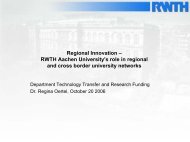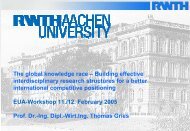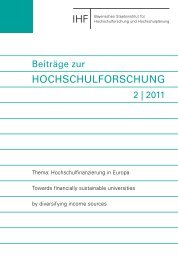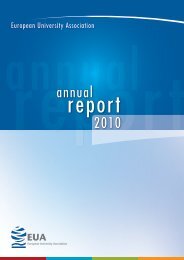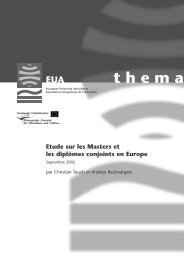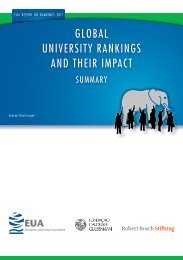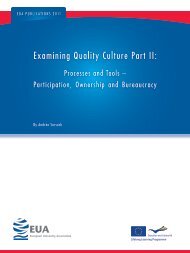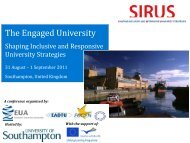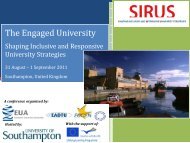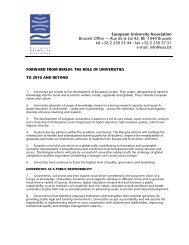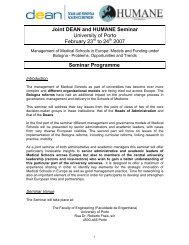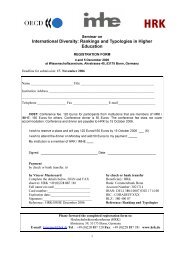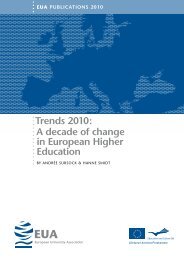Bairbre Redmond - European University Association
Bairbre Redmond - European University Association
Bairbre Redmond - European University Association
Create successful ePaper yourself
Turn your PDF publications into a flip-book with our unique Google optimized e-Paper software.
The Engaged <strong>University</strong><br />
Shaping Inclusive and Responsive<br />
<strong>University</strong> Strategies<br />
31 August – 1 September 2011<br />
Southampton, United Kingdom<br />
A conference organised by:<br />
Hosted by:<br />
With the support of:
. The Engaged <strong>University</strong>: how to make<br />
it happen?<br />
Human and financial resource<br />
considerations for student centred life<br />
long learning – Dr Sue Colley
Student centred life long learning –<br />
employability and enlightenment<br />
• “This will require universities to rethink some deep-rooted<br />
assumptions about the basic building blocks of HE –<br />
products, delivery modes and organisation – to meet<br />
different patterns of demand and opportunity”<br />
(PA Consulting Group – 2010)<br />
3
• Personal context.<br />
Overview<br />
• Challenges when developing an appropriate<br />
pedagogy.<br />
• Establishing new collaborative relationships<br />
• Reconceptualising the role of the Academic?<br />
4
Challenges when developing an<br />
appropriate pedagogy<br />
Rigor or Relevance? (Schon, 1991, 42)<br />
“It is felt that the knowledge for which the university<br />
stands lacks legitimacy; it can simply be<br />
understood as a set of language games of a rather<br />
privileged set of occupational groups (academics)<br />
that reflects their interest and marginal standing to<br />
the rest of society” (Barnett, 2000a, 411).<br />
5
Challenges, contd.<br />
• The ‘atomised modular system’ v. teaching and<br />
learning strategies that capture ‘knowledge in<br />
action’.<br />
– Modular system: awards credits against criteria that<br />
reflects traditional definitions of knowing (usually as<br />
pre-determined objectives/learning outcomes)<br />
measured mainly by the expression of language skills.<br />
– The challenge of measuring the development of<br />
‘knowledge in action’, i.e. knowledge worked out in<br />
real time in the urgency of the moment.<br />
6
Challenges - contd<br />
• Costings<br />
• Planning<br />
• Timing of engagement<br />
• Leadership<br />
7
Establishing new collaborative<br />
relationships<br />
• How the Academy structures and presents itself:<br />
– Internally as well as externally<br />
– Relationship marketing<br />
– Geography<br />
8
A New Republic of the Intellect<br />
• “For Universities, permeability is the key. The<br />
more the universities are permeable and the more<br />
the knowledge industries and all citizens who<br />
embrace intellectual pursuits and causes come<br />
within them, the more successful they will be. The<br />
best universities of the 21 st century will bring brain<br />
power together where it is, not where it can be<br />
institutionalised.“ Sir Douglas Hague, 1991, 14<br />
9
Reconceptualising the role of the academic<br />
•<br />
10
References<br />
Barnett, R (2000) <strong>University</strong><br />
knowledge in an age of<br />
supercomplexity. Higher<br />
Education 40 409-422<br />
PA Consulting Groups (2010) Escaping<br />
the Red Queen effect – succeeding in<br />
the new economics of higher education.<br />
Hague, D (1991) Beyond<br />
Universities. A New Republic of<br />
the Intellect. Institute of<br />
Economic Affairs<br />
11
. The Engaged <strong>University</strong>: how to make<br />
it happen?<br />
Human and financial resource considerations<br />
for student centred life long learning – Dr Sue<br />
Colley
Student centred life long learning –<br />
employability and enlightenment<br />
• “This will require universities to rethink some<br />
deep-rooted assumptions about the basic building<br />
blocks of HE – products, delivery modes and<br />
organisation – to meet different patterns of<br />
demand and opportunity”<br />
(PA Consulting Group – 2010)<br />
13
• Personal context.<br />
Overview<br />
• Challenges when developing an appropriate pedagogy.<br />
• Establishing new collaborative relationships<br />
• Reconceptualising the role of the Academic?<br />
14
Challenges when developing an<br />
appropriate pedagogy<br />
Rigor or Relevance? (Schon, 1991, 42)<br />
“It is felt that the knowledge for which the university<br />
stands lacks legitimacy; it can simply be understood as<br />
a set of language games of a rather privileged set of<br />
occupational groups (academics) that reflects their<br />
interest and marginal standing to the rest of society”<br />
(Barnett, 2000a, 411).<br />
15
Challenges, contd.<br />
• The ‘atomised modular system’ v. teaching and<br />
learning strategies that capture ‘knowledge in<br />
action’.<br />
– Modular system: awards credits against criteria that<br />
reflects traditional definitions of knowing (usually as<br />
pre-determined objectives/learning outcomes)<br />
measured mainly by the expression of language skills.<br />
– The challenge of measuring the development of<br />
‘knowledge in action’, i.e. knowledge worked out in<br />
real time in the urgency of the moment.<br />
16
• Costings<br />
• Planning<br />
Challenges - contd<br />
• Timing of engagement<br />
• Leadership<br />
17
Establishing new collaborative<br />
relationships<br />
• How the Academy structures and presents itself:<br />
– Internally as well as externally<br />
– Relationship marketing<br />
– Geography<br />
18
A New Republic of the Intellect<br />
• “For Universities, permeability is the key. The more<br />
the universities are permeable and the more the<br />
knowledge industries and all citizens who embrace<br />
intellectual pursuits and causes come within them, the<br />
more successful they will be. The best universities of<br />
the 21 st century will bring brain power together where<br />
it is, not where it can be institutionalised.“ Sir Douglas<br />
Hague, 1991, 14<br />
19
Reconceptualising the role of the<br />
academic<br />
• “There will in particular be greater expectations that<br />
academic researchers and teachers have ‘live’ engagement<br />
with the worlds of practice and application. The HE workforce<br />
is also likely to become much more fluid and mobile, with<br />
greater interchanges of people between the worlds of<br />
academe, business and professional practice” (PA Consulting<br />
Group,2010,10)<br />
20
Barnett, R (2000) <strong>University</strong> knowledge in<br />
an age of supercomplexity. Higher<br />
Education 40 409-422<br />
PA Consulting Groups (2010) Escaping the<br />
Red Queen effect – succeeding in the new<br />
economics of higher education.<br />
References<br />
Hague, D (1991) Beyond Universities. A<br />
New Republic of the Intellect. Institute of<br />
Economic Affairs<br />
21
The Engaged <strong>University</strong><br />
Shaping Inclusive and Responsive<br />
<strong>University</strong> Strategies<br />
31 August – 1 September 2011<br />
Southampton, United Kingdom<br />
A conference organised by:<br />
Hosted by:<br />
With the support of:
Resourcing Lifelong Learning<br />
Lessons from Irish Higher Education<br />
Prof. <strong>Bairbre</strong> <strong>Redmond</strong><br />
<strong>University</strong> College Dublin, Ireland<br />
Prof <strong>Bairbre</strong> <strong>Redmond</strong><br />
Ireland
Interrelated factors in resourcing LLL<br />
National<br />
Policies<br />
Academy<br />
Structures &<br />
Issues<br />
Economic<br />
Factors<br />
Prof <strong>Bairbre</strong> <strong>Redmond</strong><br />
Ireland
Background to Irish Education<br />
• Population : 4.32 Million<br />
• Institutions: 7 Universities , 14 Institutes of Technology and 4<br />
Schools of Education (primary training)<br />
• Spend on Education: close to the bottom of the International<br />
league table<br />
– 4.7% of GDP spent on Education (OECD average 5.7%).<br />
– 3rd Level Education spend 1.2% (OECD average 1.5%)<br />
• Structures: Well developed National Qualifications<br />
Framework (NQF) to support mobility and harmonisation<br />
Prof <strong>Bairbre</strong> <strong>Redmond</strong><br />
Ireland
Irish National Framework of Qualifications (NQF)<br />
Prof <strong>Bairbre</strong> <strong>Redmond</strong><br />
Ireland
Key Milestones in Irish Educational Policy<br />
• 1966 - 1969 – Free<br />
2 nd level funding<br />
introduced, major<br />
curricular reform<br />
introduced<br />
80<br />
70<br />
60<br />
50<br />
40<br />
30<br />
20<br />
10<br />
0<br />
1967 1986 2004<br />
Participation<br />
at 2nd level
Key Milestones in Irish Educational Policy<br />
• 1996 - Free 3 rd<br />
level funding<br />
introduced<br />
60<br />
50<br />
40<br />
30<br />
20<br />
10<br />
0<br />
1979 1992 2004<br />
Participation at<br />
3rd level
80<br />
70<br />
60<br />
50<br />
40<br />
30<br />
20<br />
10<br />
Educational Participation Rates (%)<br />
0<br />
1967 1974 1979 1986 1992 1998 2004<br />
2nd level<br />
3rd level
2.5<br />
2<br />
1.5<br />
1<br />
0.5<br />
0<br />
Odds ratios for participating in Higher Education
35<br />
30<br />
25<br />
20<br />
15<br />
10<br />
5<br />
0<br />
Percentage Rate of Drop-Out<br />
Drop-out
• High participation<br />
rate 42% of the 25-34<br />
age group has 3 rd level<br />
qualification.<br />
(OECD average - 34%)<br />
but<br />
• Lifelong Learning low<br />
against EU average<br />
and Lisbon targets.<br />
Resulting in.....<br />
45%<br />
40%<br />
35%<br />
30%<br />
25%<br />
20%<br />
15%<br />
10%<br />
5%<br />
0%<br />
25-34<br />
35-44<br />
45-54<br />
55-64
EU <strong>University</strong> Participation vs.<br />
LLL Participation (25-64 years) Eurostat ‘10<br />
<strong>University</strong> Participation LLL Participation
Students Full-time & Part-time at <strong>University</strong><br />
in Ireland & UK (2009/10)<br />
Ireland UK<br />
Full Time 96,436 (85%) 737,125 (55%)<br />
Part Time 6,448 (15%) 596,775 (45%)
Growth in Erasmus Numbers between 2007 - 2009
Mobility Factors<br />
• High number of Irish students on full-time HE programmes<br />
outside country (14% - nearly five times the EU average)<br />
• Most in Britain and Northern Ireland, smaller numbers in the<br />
US, Germany, France, and Australia.<br />
• Erasmus Outgoing student numbers less that half of<br />
Incoming. Language an issue.<br />
• Key countries of origin of Incoming students - USA; China;<br />
France; UK; Germany; Spain; Malaysia; India & Canada.<br />
Prof <strong>Bairbre</strong> <strong>Redmond</strong><br />
Ireland
Lastly – Impact of Recession on the<br />
Academy<br />
Prof <strong>Bairbre</strong> <strong>Redmond</strong><br />
Ireland
Drop in state funding<br />
for undergraduates<br />
+<br />
Inability to levy fees<br />
on undergraduates<br />
+<br />
Ban on staff<br />
replacement or<br />
recruitment<br />
Resulting in<br />
Dependency on graduate<br />
income<br />
(Professions and PhDs)<br />
Increased need to attract<br />
non-EU Students<br />
Increased focus on reskilling,<br />
rather than upskilling<br />
(CPD)<br />
Larger classes, less<br />
academic support for<br />
students
Looking Foreword<br />
• “Seek efficiencies to enable further expansion ...and<br />
make existing provision more effective.”<br />
Irish Minister for Education Ruairi Quinn ( March 2011)<br />
• Groups not benefiting from any form of learning – both<br />
overall literacy and mathematical skills are in decline<br />
nationally<br />
• Seek clarity about Institutional responsibility for<br />
Lifelong Learning - ?Role of the ITs<br />
• Play to institutional strengths and minimise duplication -<br />
create ‘Ladders of Learning’<br />
Prof <strong>Bairbre</strong> <strong>Redmond</strong><br />
Ireland
“For every complex problem there is an<br />
answer that is clear, simple, and wrong.”<br />
Prof <strong>Bairbre</strong> <strong>Redmond</strong><br />
Ireland<br />
H.L. Mecken
Thank You<br />
Go Raibh Maith Agaibh<br />
bairbre.redmond@ucd.ie<br />
Prof <strong>Bairbre</strong> <strong>Redmond</strong><br />
Ireland
Statistical Sources<br />
• Higher Education Authority, Irish Higher Education Statistical Publications:<br />
http://www.hea.ie/en/statistics+publications<br />
• Higher Education Authority Hidden Disadvantage<br />
http://www.hea.ie/files/files/file/DoE/Hidden%20Disdvantage%20HEA-<br />
ESRI%20Non-Manual%20Study.pdf<br />
• Education Ireland, International Students in Higher Education in Ireland<br />
2010: http://www.educationireland.ie/why-ireland/publications.html<br />
• <strong>European</strong> Commission, Erasmus Statistics,<br />
http://ec.europa.eu/education/erasmus/doc920_en.htm<br />
• Eurostat Lifelong Learning Statistics<br />
• http://epp.eurostat.ec.europa.eu/statistics_explained/index.php/Lifelong_lea<br />
rning_statistics
The Engaged <strong>University</strong><br />
Shaping Inclusive and Responsive<br />
<strong>University</strong> Strategies<br />
31 August – 1 September 2011<br />
Southampton, United Kingdom<br />
A conference organised by:<br />
Hosted by:<br />
With the support of:



